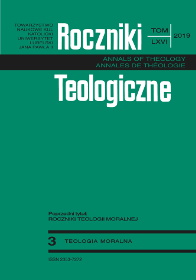Person and Conscience: Augustinian Strands in John-Paul's Ethics
Abstract
The wide appeal of Veritatis Splendor lay in its Augustinianism. Two Augustinian themes predominate in Wojtyła's thought, one derived from Max Scheler, the other from Henri de Lubac and the nouvelle théologie. The unity of being and the good is the basis on which he can reassert the ontological integrity of the personal agent. The priority of divine grace in leading the human agent to moral fulfilment directs his thinking about the conscience as an inner dialogue with God. All moral self-awareness depends on that encounter, while the continuity of the person makes possible the accrual of moral experience.
References
Augustine. De natura boni. PL 42.
Balthasar, Hans-Urs von. “Neun Sätze zur christlichen Ethik”. In J. Ratzinger et al. Prinzipien christlicher Moral. Einsiedeln: Johannes, 1975.
Kant, Immanuel. Kritik der reine Vernunft. AK 5.
Scheler, Max. Der Formalismus in der Ethik und die materiale Wertethik: neuer Versuch der Grundlegung eines ethischen Personalismus. Halle: Niemeyer, 1913 (1916).
Spaemann, Robert. Personen. Stuttgart: Klett-Cotta, 1996.
Wilkins, John (ed.). Understanding `Veritatis Splendor'. London: SPCK, 1994.
Wojtyła, Karol. Osoba i czyn (1969). English: The Acting Person, tr. Andrzej Potocki, Anna-Teresa Tymieniecka. Dordrecht & Boston: Reidel, 1979.
Copyright (c) 2019 Roczniki Teologiczne

This work is licensed under a Creative Commons Attribution-NonCommercial-NoDerivatives 4.0 International License.





